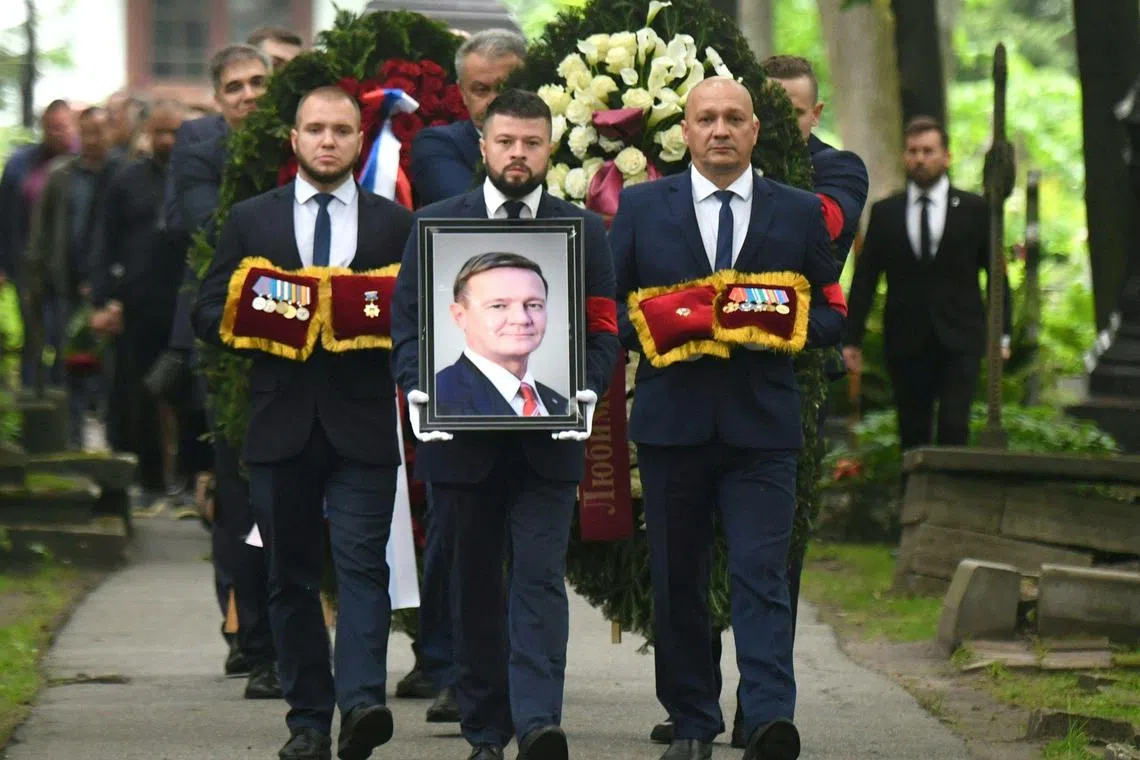Minister’s death spooks Russian elite amid corruption clampdown
Sign up now: Get ST's newsletters delivered to your inbox

Russia’s former transport minister Roman Starovoyt, who died by suicide, was buried in St Petersburg on July 11.
PHOTO: AFP
Follow topic:
ST PETERSBURG – The reported suicide of Russia’s transport minister hours after he was dismissed by President Vladimir Putin, sparking speculation he would be arrested on corruption charges, has shaken the country’s elite.
Mr Roman Starovoyt was buried in Saint Petersburg on July 11, with his family weeping at his open coffin before it was lowered into the ground.
The 53-year-old was found dead in his car
Russian investigators say he shot himself.
Media reports said he was being investigated for corruption
While government departments sent flowers and some ministers attended a memorial ceremony in Moscow a day earlier, there was unease over the fate of Mr Starovoyt, who climbed the ranks of Russia’s bureaucracy to a seat in the Cabinet.
“It’s a great loss. Very unexpected,” said Ms Valentina, a 42-year-old translator whose husband worked with Mr Starovoyt. “He was very active, cheerful and loved life very much. I don’t know how it happened.”
‘Scapegoat’
Mr Starovoyt was governor of Russia’s western Kursk region before he was promoted to Moscow, just a few months before Ukrainian troops captured dozens of border settlements in a surprise cross-border incursion.
His successor was arrested in the spring for embezzling funds intended to beef up the fortifications that Ukraine ended up slicing through with ease.
“They tried to make him the scapegoat… It’s easier to put the blame on a civilian official,” political commentator Andrey Pertsev said.
The case is one part of a wider crackdown on officials alleged to have enriched themselves at the expense of the Russian army during the Ukraine offensive.
The crackdown is a Kremlin campaign that has ripped up previous norms about what is acceptable for Russian officials.
“There used to be rules, where people knew that, once you climbed up high enough, they wouldn’t mess with you,” Mr Pertsev said. “But they do not work any more.”
In a sign of how out of favour Mr Starovoyt had become, Mr Putin has not publicly commented on his death.
Asked if Mr Putin would attend the ceremony in Moscow, his spokesman told reporters: “The President has a different work schedule today.”
At the funeral in Saint Petersburg on July 11, two regional governors were the highest ranking officials to show up.
‘Holy war’
While Mr Putin has criticised corruption and vowed to stamp it out throughout his 25 years in power, his rule has been characterised by systemic graft, critics say.
The smattering of high-profile arrests has more typically been used to target opponents or come about as the result of infighting among those lower down Russia’s chain of power.
But the military offensive against Ukraine
“Something within the system has started to work completely differently,” analyst Tatiana Stanovaya wrote after Mr Starovoyt’s death.
“Any action or inaction that, in the eyes of the authorities, increases the state’s vulnerability to hostile actions by the enemy must be punished mercilessly and uncompromisingly,” she said.
In such a climate, it was inevitable that heads would have to roll over the Kursk failings.
Professor Nina Khrushcheva, who teaches at The New School, a university in New York City, said Mr Starovoyt’s apparent suicide showed the Russian elite was “scared”.
The current climate is such that “it is impossible to leave the top brass”, said Prof Khrushcheva, who is also the great-granddaughter of Soviet leader Nikita Khrushchev.
“This is something we have not really seen since 1953,” she said, referring to Joseph Stalin’s execution of a close ally.
To the Kremlin, the Ukraine military campaign is a “holy war” that has rewritten the rules of loyalty and service.
“During a holy war, you don’t steal… You tighten your belts and work 24 hours a day to make the weapons you need.”
That atmosphere, said Ms Stanovaya, has created a “sense of hopelessness” among officials in Moscow that is unlikely to fade.
“Going forward, the system will be ready to sacrifice increasingly prominent figures,” she warned. AFP

